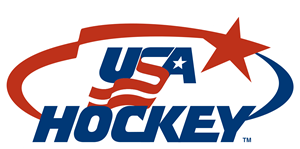The Game of Hockey
The players
Goaltender: The goalie's primary task is simple - keep the puck out of his own net. Offensively, he might start his team down the ice with a pass, but seldom does he leave the net.
Defensemen: These players try to stop the incoming play at their own blue line. They try to break up passes, block shots, cover opposing forwards (center and wings) and clear the puck from in front of their own goal. Offensively, they get the puck to their forwards and follow the play into the attacking zone, positioning themselves just inside their opponent's blue line at the "points."
Center: The quarterback on the ice, the center leads the attack by carrying the puck on offense. He exchanges passes with his wings to steer the play toward the opposing goal. On defense, he tries to disrupt a play before it gets on his team's side of the ice.
Wings: The wings team with the center on the attack to set up shots on goal. Defensively, they attempt to break up plays by their counterparts and upset shot attempts.
the officials
Referee: The referee supervises the game, calls the penalties, determines if goals are scored and handles faceoffs at center ice at the start of each period.
Linesmen: Two are used. They call offside, offside pass, icing and handle all faceoffs not occurring at center ice. They do not call penalties, but can recommend to the referee that a penalty be called.
Goal Judges: One sits off-ice behind each goal and indicates when the puck has crossed the red goal line by turning on a red light just above his station. The referee can ask his advise on disputed goals, but the referee has final authority and can overrule the goal judge.
Official Scorer: He determines which player scores and credits assists if there are any. He might consult the referee, but the scorer is the final authority in crediting points.
three main rules
Offsides: When any member of the attacking team precedes the puck over the defending team's blue line.
Offside (or two-line)Pass: When a player passes the puck from his defending zone to a teammate beyond the red center line.
Icing: When a player shoots the puck across the center red line and past the opposing red goal line. Icing is not called if the player's team is killing a penalty, a teammate of the player shooting the puck touches it before a player from the opposing team, the defending goalie touches the puck first or if the puck travels through the crease (semicircle of blue paint at the "mouth" of the goal) on its way to the red line.
the penalties
A team plays shorthanded when one or more of its players is charged with a penalty. However, no team is forced to play more than two players below full strength (six) at any tiime. If a third penalty is assessed to the same team, it is suspended until the first penalty expires. When a penalty is called on a goalie, a teammate serves his time in the penalty box.
Minor Penalty: Two minutes - Called for boarding, charging, cross-checking, elbowing, holding, hooking, high-sticking, interference, roughing, slashing, spearing, tripping and unsportsmanlike conduct.
Major Penalty: Five minutes - Called for fighting or when minor penalties are committed with deliberate intent to injure. Major penalties for slashing, spearing, high-sticking, butt-ending and cross-checking carry automatic game misconducts.
Misconduct: Ten minutes - Called for various forms of unsportsmanlike behavior or when a player incurs a second major penalty in a game. This is a penalty against an individual and not a team, so a substitute is permitted.
Penalty Shot: A free shot, unopposed except for the goalie, given to a player who is illegally impeded from behind when in possession of the puck with no opponent between him and the goal except the goalie. The team which commits the offense is not penalized beyond the penalty shot, whether it succeeds or not.
Delayed Penalty: The whistle is delayed until the penalized team regains possession of the puck.
THE RINK

Oops!
You have unsaved elements
Please save or cancel the pending changes to the elements within your page and then try saving again.


